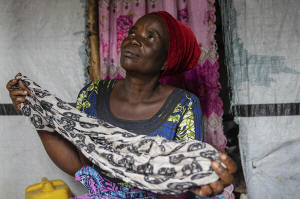Years of war in Congo have created a dire mental health crisis. But
little support is available
 Send a link to a friend
Send a link to a friend
 [October 16, 2024]
By SAM MEDNICK and RUTH ALONGA [October 16, 2024]
By SAM MEDNICK and RUTH ALONGA
GOMA, Congo (AP) — For Nelly Shukuru, there was no way out. The fighting
that forced her from her home, the squalid conditions in the
displacement camp in eastern Congo, the hunger, all felt inescapable.
The 51-year-old planned to hang herself.
She said a neighbor stopped her just in time. “In my mind, the suffering
was permanent," said the mother of six, seated in a health clinic. “The
people who have died are better off than I am.”
Years of conflict in eastern Congo have created a dire mental health
crisis. Aid groups say the number of people seeking care has spiked as
fighting intensifies. Some of the worst affected struggle to survive in
cramped, violent displacement sites that aren't conducive to recovery.
The number of people who received psychosocial support in camps around
the main city of Goma increased more than 200% between January and June
compared to the same period last year — from 6,600 to more than 20,000 —
according to aid group Action Against Hunger.
The number of people reporting suicidal thoughts has jumped from about
five a month at the beginning of the year to more than 120, it said.
___
EDITOR’S NOTE — This story includes discussion of suicide. If you or
someone you know needs help, the national suicide and crisis lifeline in
the U.S. is available by calling or texting 988. There is also an online
chat at 988lifeline.org. Internationally, many governments and other
organizations offer help and information on how to contact them is
available online.

___
More than 100 armed groups have been vying for a foothold in
mineral-rich eastern Congo near the border with Rwanda. The violence has
escalated as the M23 rebel group, backed by Rwanda, has reemerged. The
fighting has displaced millions. Over 600,000 shelter in camps near Goma.
More people are experiencing anxiety, depression and post-traumatic
stress disorder as well as insomnia and excessive alcohol and drug
consumption, psychologists say.
“All around us there is war, and the number of people facing difficulty
is increasing daily,” said Innocent Ntamuheza, a psychologist with
Action Against Hunger.
But little mental health support is available. Less than 30% of the
requested $180 million for protection — which includes mental health
services — in the humanitarian response plan has been funded this year,
said the United Nations, which calls Congo one of the world’s most
neglected crises.
Shukuru said she considered killing herself in August after her drunk
21-year-old son struck her head with a rock because of a fight over a
radio. Her children’s drinking had worsened since arriving in the camp
because they were idle, she said. The family used to farm and attend
church in their hometown of Sake but fled in February when it was
bombed.
Her husband, a construction worker, struggles to find jobs. The aid they
receive isn't enough.
Some of the camps for displaced families are less than a day's walk from
the front lines. The camp where Shukuru lives was struck by shells in
May that killed some 40 people and injured others, locals and aid groups
said.
Some armed men live among the camps' population. During a visit in
August, The Associated Press saw men carrying guns and a truck of people
in military fatigues drive through, chanting war songs. It wasn't clear
if the people were with the military or self-defense groups.
In the government's attempt to push back M23, it's been supporting
militia groups under a coalition called the Wazalendo. But the groups,
who previously fought government forces and each other, are accused of
committing human rights abuses, locals and aid groups said.
[to top of second column]
|

Nelly Shukuru, 51, hold the scarf she had planned on using to hang
herself after spending three years displaced in the Lushagala camp
in Goma, Democratic Republic of the Congo, Tuesday, Aug. 27, 2024.
(AP Photo/Moses Sawasawa)
 Some fighters and members of Congo's
army, often stationed nearby, are also accused of sexual assault.
A 38-year-old said she was raped by three armed men in a field while
she was looking for food in May. The AP does not name people who
have been sexually assaulted. The mother of eight has been seeking
help at a clinic run by Doctors Without Borders, also known by its
acronym MSF, but said she often can’t sleep at night and sees the
men in her dreams.
The constant presence of armed men in the camp makes it worse.
“It reminds me of the men who raped me,” she said.
People relive traumatic incidents especially when it comes to rape,
said Clementine Sifa, the mental health supervisor for MSF.
In September, MSF said it treated an unprecedented number of
survivors of sexual violence in Congo last year — more than 25,000 —
with the trend continuing this year. The majority of people were
treated in displacement camps in Goma.
Lt. Col. Guillaume Ndjike, spokesman for Congo's army in the east,
said the army is trying to protect people in the camps by conducting
night patrols and setting up mobile police stations. He said armed
men aren't allowed in the sites, and people accused of sexual
assault or murder are apprehended and held accountable.
Locals and aid workers say there is little accountability.
Some aid groups are training community leaders to spot signs of
people who might need mental health support and refer them to a
clinic. They watch for people who are isolated, look stressed or
have lost their jobs. Stigma surrounding mental health sometimes
keeps people from proactively seeking it, they said.
Those who have sought treatment say it's been helpful to learn ways
to cope with anxiety and negative thoughts, including breathing
techniques.
Wrapping her arms around her chest and tapping her shoulders,
Josephine Mulonda said the technique called “butterfly hug” has
helped reduce heart palpitations triggered by her husband's killing
in January. The 52-year-old had depressive thoughts and worried how
she would support their eight children.
War Child, an organization focused on helping children in conflict,
uses movement, song and play to help troubled youth express
themselves. Dancing in a circle at a displacement site, children
chant “Let me cry, I’m crying.” The group also gives parents advice
on listening to their children, said Isaac Rwamakuba, War Child's
coordinator in Goma for emergency responses.
But he said some of the most affected children lost families through
death or separation.
Last November, a 14-year-old was separated from her family when her
town was attacked. The AP is not using her name due to the
sensitivity of her situation. She is cared for by another family but
fears being attacked when she walks for hours into the bush to find
firewood to sell.

She's considered ending her life to stop the suffering, she said.
The psychological support from War Child helps at least momentarily,
she said.
She has no idea if her mother is alive.
All contents © copyright 2024 Associated Press. All rights reserved |